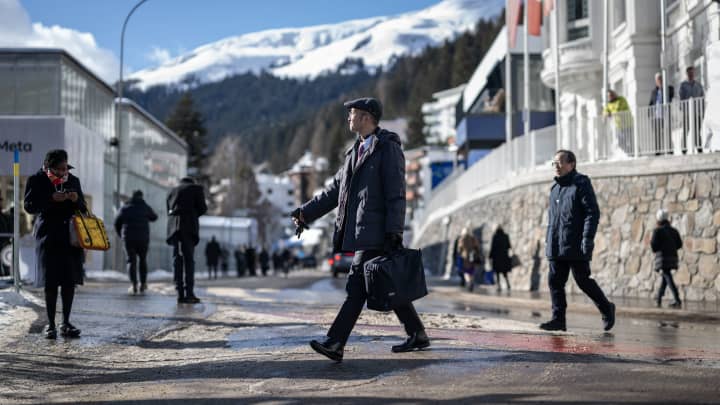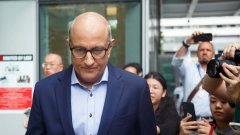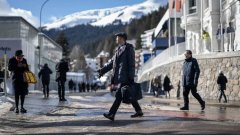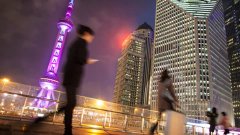
Davos, SWITZERLAND — China returned to Davos in full force this week as it attempts to thaw relations with the international community and court investment following years of Covid-19 lockdowns and rising geopolitical tensions.
A delegation led by Chinese Premier Li Qiang is estimated to be the largest since 2017, when President Xi Jinping led an of Chinese business leaders and billionaires up the Swiss mountain.
Addressing the forum , Li, China's second in command, said the country was open for business, seemingly downplaying a recent crackdown on private industry which has spooked investors and prompted
"Choosing investment in the Chinese market is not a risk, but an opportunity," he said.
Li went on to meet for lunch with a host of top business leaders, including the CEOs of JPMorgan, Bank of America, Standard Chartered and Blackstone. Also present was the governor of the People's Bank of China.
He was joined by several other high ranking ministerial representatives including the Deputy Foreign Minister Ma Zhaoxu and Commerce Minister Wang Wentao.
Outside the main congress center, one group of Chinese delegates CNBC spoke to said they were attending for a broad brush of issues including "finance and trade and commerce."
"It's a great time to tell the China story," another Chinese tech executive said.
The amped up Chinese presence has reportedly ruffled feathers in Washington amid U.S. concerns about Beijing's growing global influence.
A U.S. State Department document dated Jan. 12 said that "10 state ministers" would be included in Beijing's Davos delegation, prompting the White House to step up its charm offensive, to Politico.
The document dubbed the presence a "pseudo state visit," with the Chinese delegation also expected to meet with Swiss counterparts in the capital, Bern, later in the week. In response, the schedule of Secretary of State Anthony Blinken, also attending Davos, was reportedly updated to include a meeting with Swiss officials.
The State Department did not immediately respond to a CNBC request for comment on Blinken's amended agenda.
It comes as relations between the U.S. and China have grown increasingly fractured amid national security concerns and rising geopolitical tensions, particularly over Taiwan and Russia. That has prompted Washington to embark on a , including curbing trade of some critical technologies.
Li, in his keynote address, pushed back against the move, saying that tech innovations should not be used as a way to restrict or contain other countries.
"To keep the competition healthy and bring out the greatest vitality, the only way is to enhance cooperation," he said.
The comments speak to the confliction other countries face, including Switzerland and Europe more broadly, in picking alliances in the standoff between the world's two largest economies. Europe, a close ally of the U.S., is equally aware of how important the Chinese market is for its domestic companies.
Still, confidence in China has been knocked by the country's prolonged and stringent Covid lockdowns, as well as its broader clampdown on key industries, including Big Tech.
Notably, Xi's 2017 entourage included Jack Ma, founder of Alibaba, and Wang Jianlin, chairman of property developer Dalian Wanda, both of whom have since fallen out of favor with Chinese authorities amid a clampdown on private business and a collapse in the country's property market.
As a result, Chinese firms are now investing more abroad than foreign firms are investing in China. Foreign investors withdrew from China in the third quarter of 2023. Meanwhile, international investors have withdrawn around from the Chinese stock market since August 2023.
Ian Bremmer, president and found of the Eurasia Group, said that China's increased Davos presence indicated that Xi acknowledges the challenges Beijing now faces in re-establishing its reputation on the international stage.
"It's necessary for a country that's underperforming economically in a big way," Bremmer told Semafor.
"Xi recognizes it; [it] implies better managed relations for the West with China at least in the near term," he added.
The World Economic Forum did not respond to a CNBC request for confirmation on the number of Chinese delegates in attendance.




